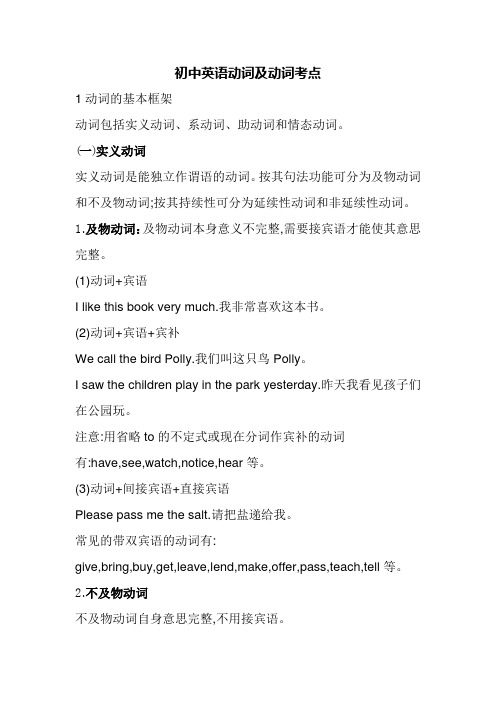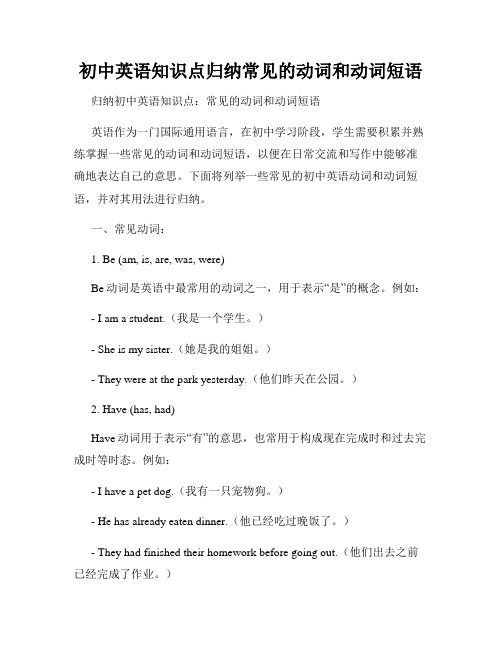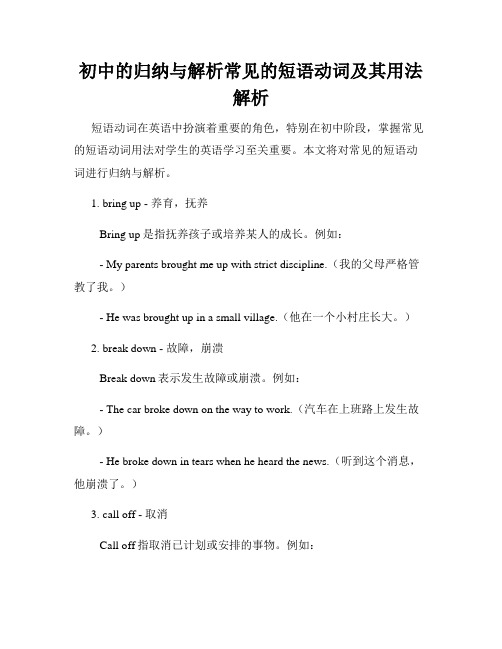初中英语常见动词短语归纳讲解学习
初中英语常用动词不定式的短语归纳

初中英语常用动词不定式的短语归纳动词不定式是英语语法中的一种非谓语动词形式,它由动词原形加上不定式符号to构成。
在初中英语中,学生们经常会遇到一些常用的动词不定式短语。
本文将对这些常用的动词不定式短语进行归纳总结。
1. 动词不定式用作目的状语动词不定式可以用来表达某种行为的目的或者目标。
常见的动词不定式短语包括:- in order to + 不定式:为了做某事。
例:I study hard in order to pass the exam.(我努力学习以通过考试。
)- so as to + 不定式:为了做某事。
例:She arrived early so as to find a good seat.(她早早到来是为了找一个好位置。
)- for + 不定式:为了做某事。
例:He exercises every day for better health.(他每天锻炼是为了更好的健康。
)2. 动词不定式用作主语动词不定式可以用作句子的主语,表示某种行为或者状态。
常见的动词不定式短语包括:- to + 不定式:做某事。
例:To learn a foreign language is beneficial for personal development.(学习一门外语对个人发展是有益的。
)- for + 名词 + to + 不定式:做某事。
例:For children to play outdoors is essential for their physical and mental health.(儿童出门玩耍对他们的身心健康至关重要。
)- it + 视为 + 不定式 + that从句:某人认为/觉得…例:It is important to eat a balanced diet every day.(每天吃均衡的饮食很重要。
)3. 动词不定式用作宾语动词不定式可以用作动词的宾语,表示某种行为的完成或者主观愿望。
初中英语动词及动词短语考点

初中英语动词及动词考点1动词的基本框架动词包括实义动词、系动词、助动词和情态动词。
(一)实义动词实义动词是能独立作谓语的动词。
按其句法功能可分为及物动词和不及物动词;按其持续性可分为延续性动词和非延续性动词。
1.及物动词:及物动词本身意义不完整,需要接宾语才能使其意思完整。
(1)动词+宾语I like this book very much.我非常喜欢这本书。
(2)动词+宾语+宾补We call the bird Polly.我们叫这只鸟Polly。
I saw the children play in the park yesterday.昨天我看见孩子们在公园玩。
注意:用省略to的不定式或现在分词作宾补的动词有:have,see,watch,notice,hear等。
(3)动词+间接宾语+直接宾语Please pass me the salt.请把盐递给我。
常见的带双宾语的动词有:give,bring,buy,get,leave,lend,make,offer,pass,teach,tell等。
2.不及物动词不及物动词自身意思完整,不用接宾语。
Horses run fast.马跑得快。
(1)有些动词既可作及物动词又可作不及物动词。
We study English.我们学习英语。
(及物动词)We study hard.我们努力学习。
(不及物动词)(2)有些不及物动词与一些别的词搭配在一起构成动词短语,它的作用相当于一个及物动词。
①动词+介词Listen to the teacher carefully.仔细听老师讲。
此类动词短语后面的宾语无论是名词还是代词,都只能放在介词后面,不能放在动词和介词之间。
②动词+副词+介词Let’s go on with our work!让我们继续我们的工作吧!He gets along well with his classmates.他与他的同学们相处得很好。
初中英语知识归纳常用动词短语和名词短语的搭配和用法

初中英语知识归纳常用动词短语和名词短语的搭配和用法在初中英语学习中,动词短语和名词短语的正确搭配和使用是非常重要的。
本文将归纳总结一些常用的动词短语和名词短语,以帮助同学们更好地掌握它们的用法。
一、常用动词短语的搭配和用法1. take care of:照顾,照料例句:My mother always takes care of me when I am sick.(我生病时,妈妈总是照顾我。
)2. go for:喜欢,追求例句:I really go for that new movie.(我真的很喜欢那部新电影。
)3. get along with:与...相处,和...友好相处例句:She gets along with her classmates very well.(她和她的同学相处得很好。
)4. look forward to:期待,盼望例句:I am looking forward to the summer vacation.(我期待着暑假的到来。
)5. make up:编造,组成例句:He always makes up excuses for being late.(他总是为迟到编造借口。
)6. give up:放弃例句:Don't give up even when things get tough.(事情变得困难时也不要放弃。
)7. put off:推迟,延迟例句:The meeting was put off until next Monday.(会议被推迟到下周一。
)8. catch up with:迎头赶上,赶上某人例句:He ran fast to catch up with his friends.(他跑得很快,赶上了他的朋友们。
)二、常用名词短语的搭配和用法1. a piece of:一片,一块例句:Please give me a piece of paper.(请给我一张纸。
初中英语知识点归纳常见的动词和动词短语

初中英语知识点归纳常见的动词和动词短语归纳初中英语知识点:常见的动词和动词短语英语作为一门国际通用语言,在初中学习阶段,学生需要积累并熟练掌握一些常见的动词和动词短语,以便在日常交流和写作中能够准确地表达自己的意思。
下面将列举一些常见的初中英语动词和动词短语,并对其用法进行归纳。
一、常见动词:1. Be (am, is, are, was, were)Be动词是英语中最常用的动词之一,用于表示“是”的概念。
例如:- I am a student.(我是一个学生。
)- She is my sister.(她是我的姐姐。
)- They were at the park yesterday.(他们昨天在公园。
)2. Have (has, had)Have动词用于表示“有”的意思,也常用于构成现在完成时和过去完成时等时态。
例如:- I have a pet dog.(我有一只宠物狗。
)- He has already eaten dinner.(他已经吃过晚饭了。
)- They had finished their homework before going out.(他们出去之前已经完成了作业。
)3. Do (does, did)Do动词常用于构成否定句、疑问句和一般疑问句等句子结构中。
例如:- I don't like coffee.(我不喜欢咖啡。
)- Does she play the piano?(她会弹钢琴吗?)- Did you go to the park yesterday?(你昨天去了公园吗?)4. Go (goes, went, gone)Go动词表示“去”的动作,也常用于构成进行时态和完成时态等句子。
例如:- I go to school by bus.(我坐公交车去上学。
)- She often goes swimming on weekends.(她经常在周末去游泳。
初中的归纳与解析常见的短语动词及其用法解析

初中的归纳与解析常见的短语动词及其用法解析短语动词在英语中扮演着重要的角色,特别在初中阶段,掌握常见的短语动词用法对学生的英语学习至关重要。
本文将对常见的短语动词进行归纳与解析。
1. bring up - 养育,抚养Bring up是指抚养孩子或培养某人的成长。
例如:- My parents brought me up with strict discipline.(我的父母严格管教了我。
)- He was brought up in a small village.(他在一个小村庄长大。
)2. break down - 故障,崩溃Break down表示发生故障或崩溃。
例如:- The car broke down on the way to work.(汽车在上班路上发生故障。
)- He broke down in tears when he heard the news.(听到这个消息,他崩溃了。
)3. call off - 取消Call off指取消已计划或安排的事物。
例如:- They called off the meeting due to bad weather.(因为天气原因,他们取消了会议。
)- The football match was called off because of the heavy rain.(由于大雨,足球比赛被取消。
)4. come across - 偶然遇到Come across表示偶然遇到某人或某事。
例如:- I came across an old friend at the supermarket.(我在超市偶然遇到了一个老朋友。
)- He came across an interesting book while cleaning the attic.(在清理阁楼时,他偶然发现了一本有趣的书。
)5. get along with - 与...相处融洽Get along with表示与某人相处融洽。
中考英语初中常见动词短语分类介绍

中考英语初中常见动词短语分类介绍1.实义动词短语(Phrasal Verbs)实义动词短语是由动词和介词、副词等构成的固定搭配,在句子中作为整体使用。
常见的实义动词短语有:- Look after: 照顾- Take off: 脱下,起飞- Turn on: 打开- Put on: 穿上- Give up: 放弃- Get up: 起床2.系动词短语(Copular Verbs)系动词短语是由系动词和形容词、名词等构成的固定搭配,在句子中用来说明主语的状态或性质。
常见的系动词短语有:- Be happy: 快乐- Look tired: 看起来累- Feel sick: 感觉不舒服- Seem impossible: 看起来不可能3.动词+名词短语(Verb+Object Phrase)动词+名词短语是由动词和宾语组成的固定搭配,在句子中表示动作和接受动作的对象。
常见的动词+名词短语有:- Do homework: 做作业- Play basketball: 打篮球- Buy a book: 买书- Open the door: 打开门- Write a letter: 写信4.动词+副词短语(Verb+Adverb Phrase)动词+副词短语是由动词和副词构成的固定搭配,在句子中表示动作的方式、频率等。
- Speak loudly: 大声说话- Drive carefully: 小心驾驶- Walk slowly: 慢慢走- Eat quickly: 快速吃- Study hard: 努力学习这些是中考英语常见的动词短语分类及其例子,熟练掌握这些固定搭配可以帮助学生更好地理解和运用英语。
初中英语动副短语归纳总结
初中英语动副短语归纳总结在学习英语过程中,动副短语是我们必须熟练掌握的一部分。
动副短语由动词和副词构成,可以起到修饰动词、形容词或副词的作用。
下面将对初中英语常见的动副短语进行归纳总结,以帮助同学们更好地理解和使用。
1. 以动词“look”开头的动副短语:Look after:照顾例句:My sister is old enough to look after herself now.Look around:四处看看例句:We decided to look around the city and explore its beauty.Look back:回顾,回忆例句:As I look back on my childhood, I realize how much I've grown.Look for:寻找例句:I'm looking for my lost keys. Have you seen them?Look forward to:期待例句:I'm really looking forward to the summer vacation.2. 以动词“take”开头的动副短语:Take care of:照顾,保重例句:Don't worry about me. I can take care of myself.Take off:起飞例句:The plane is scheduled to take off at 9:00 am tomorrow.Take out:取出,带出去例句:I need to take out some cash from the ATM.Take up:开始从事,占用例句:I've decided to take up painting as a new hobby.Take on:雇佣,承担例句:The company is planning to take on new employees next month.3. 以动词“turn”开头的动副短语:Turn on:打开例句:Can you please turn on the lights? It's too dark here.Turn off:关闭例句:Don't forget to turn off the TV before you leave the room.Turn up:出现,到达例句:He didn't turn up for the meeting, so we started without him. Turn down:拒绝例句:She turned down the job offer because the salary was too low.Turn around:转身,扭转局势例句:The team managed to turn around the game in the second half.4. 以动词“set”开头的动副短语:Set up:建立,设置例句:They are planning to set up a new branch in the city.Set off:出发,引爆例句:We're going to set off for the beach early tomorrow morning.Set aside:留出,拨出例句:It's important to set aside some time for relaxation.Set back:推迟,阻碍例句:The bad weather set back the construction of the new bridge.Settle down:安定下来例句:After traveling for many years, he finally settled down in a small town.5. 以动词“bring”开头的动副短语:Bring up:抚养,提出例句:He was brought up by his grandparents after his parents passed away.Bring in:引进,带来例句:The company decided to bring in a new management team.Bring along:带来,带着例句:Don't forget to bring along your passport when traveling abroad.Bring about:引起,导致例句:His careless behavior brought about the accident.Bring together:聚集,使团结例句:The concert brought together people from all walks of life.以上是初中英语常见的动副短语的归纳总结,希望对同学们的英语学习有所帮助。
七年级英语短语归纳
七年级英语短语归纳一、前言七年级是初中英语学习的起点,这一阶段的短语积累对于学生来说至关重要。
通过归纳和掌握常用的英语短语,可以帮助学生更好地理解英语句子,提高阅读和写作能力,为未来的英语学习打下坚实的基础。
本文将对七年级英语短语进行详细介绍,包括短语的分类、用法和示例,以帮助学生更好地理解和运用这些短语。
二、七年级英语短语分类1. 动词短语动词短语是英语中常见的短语类型,主要包括动词+副词、动词+介词、动词+名词等结构。
(1)动词+副词例如:look after(照顾)、run quickly(快速跑)、eat together(一起吃)等。
(2)动词+介词例如:put on(穿上)、go to(去)、take out(拿出)等。
(3)动词+名词例如:do exercise(做运动)、have a rest(休息)、have a party(聚会)等。
2. 形容词短语形容词短语主要用于修饰名词或代词,表示事物的特征、状态等。
例如:tall(高的)、happy(快乐的)、big(大的)等。
3. 副词短语副词短语用于修饰动词、形容词或其他副词,表示程度、时间、地点等。
例如:very(非常)、quickly(快速地)、always(总是)等。
4. 介词短语介词短语由介词加上名词或代词构成,表示时间、地点、方向等。
例如:in front of(在前面)、behind(在后面)、above(在上面)等。
5. 代词短语代词短语由代词和其他词构成,用于指代特定的人或事物。
例如:somebody else(别人)、something(某事)、everybody(每个人)等。
三、短语用法和示例1. 动词短语(1)look after用法:look after sb./sth.,表示照顾、照看。
示例:My mother looks after me very well.(我妈妈照顾我很周到。
)(2)run quickly用法:run quickly,表示快速跑。
初中英语知识点归纳常见动词短语和固定搭配
初中英语知识点归纳常见动词短语和固定搭配动词短语和固定搭配在英语学习中是非常重要的一部分。
它们能够帮助我们更准确地表达自己的意思,使我们的英语更加地地道和自然。
在初中英语学习中,我们经常会遇到一些常见的动词短语和固定搭配,下面将对其中的一些进行归纳总结。
一、常见动词短语1. Look after:照顾例句:My sister is looking after my pet dog while I am on vacation.2. Take care of:照顾例句:I need to take care of my younger brother when my parents arenot at home.3. Get up:起床例句:I usually get up early in the morning to prepare for school.4. Wake up:醒来例句:She woke up late and missed the bus to school.5. Go on:继续例句:After a short break, the teacher asked the students to go on with their presentation.6. Carry on:继续例句:We should carry on learning even when facing difficulties.7. Put on:穿上例句:She put on her favorite dress for the party.8. Take off:脱下例句:He took off his hat as a sign of respect.9. Pick up:拾起例句:Please pick up the toys and put them in the toy box.10. Turn on:打开例句:I turned on the TV to watch my favorite show.二、常见固定搭配1. Make a decision:做出决定例句:It is not easy for me to make a decision about which college to attend.2. Take a break:休息一下例句:Let's take a break and have a cup of tea.3. Have a good time:玩得开心例句:We had a good time at the amusement park yesterday.4. Give up:放弃例句:Don't give up when facing challenges. Keep trying!5. Get along with:与……相处例句:I get along very well with my classmates.6. Look forward to:期待例句:I am looking forward to the summer vacation.7. Catch up with:赶上例句:I need to study harder to catch up with my classmates.8. Put off:推迟例句:The meeting has been put off until next week.9. Make progress:取得进步例句:She has made great progress in learning English.10. Keep in touch:保持联系例句:Although they live in different cities now, they still keep in touch with each other.以上是初中英语知识点归纳常见动词短语和固定搭配的内容。
动词短语知识点总结
动词短语知识点总结动词短语是由一个或多个动词和它们的宾语、补语、副词、介词短语等修饰语组成的短语。
动词短语是语言中最基本的成分之一,它主要用来表达动作、状态或行为。
在英语中,动词短语的种类繁多,使用频率较高,因此掌握动词短语对于学习英语至关重要。
下面我们就来总结一下动词短语的知识点。
一、动词短语的构成动词短语由动词和其后的宾语、补语、副词、介词短语等修饰语组成,其中主要包括以下几种结构:1. 动词 + 名词如:take a walk(散步)、make a decision(做决定)、have a drink(喝一杯)2. 动词 + 副词如:go out(出去)、come in(进来)、look up(查找)3. 动词 + 介词短语如:come across(偶然发现)、look for(寻找)、give up(放弃)4. 动词 + 宾语 + 宾语补足语如:make him happy(使他高兴)、call her a doctor(叫她医生)5. 动词 + 宾语 + 宾语补语如:consider him a friend(认为他是朋友)、find the room clean(发现房间干净)6. 动词 + 宾补如:find the food delicious(发现食物好吃)、keep the door closed(保持门闭着)7. 动词 + 状语如:speak clearly(讲话清楚)、run fast(跑得快)二、动词短语的用法1. 表示动作或状态动词短语主要用来表达动作或状态,如:make a decision(做决定)、come in(进来)、look for(寻找)等。
2. 表示行为方式有些动词短语可以表示动作执行的方式,如:speak clearly(讲话清楚)、run fast(跑得快)、write neatly(写得整洁)等。
3. 表示时间和频率动词短语还可以表示时间和频率,如:go out(出去)、come across(偶然遇见)、look forward to(期待)等。
- 1、下载文档前请自行甄别文档内容的完整性,平台不提供额外的编辑、内容补充、找答案等附加服务。
- 2、"仅部分预览"的文档,不可在线预览部分如存在完整性等问题,可反馈申请退款(可完整预览的文档不适用该条件!)。
- 3、如文档侵犯您的权益,请联系客服反馈,我们会尽快为您处理(人工客服工作时间:9:00-18:30)。
初中英语常见动词短语归纳A)动词+ 介词agree with同意......的意见(想法);符合base on以......(为)根据listen to听......get to到达......fall off (从......)掉下help ... with ...帮助(某人)做(某事)knock at /on敲(门、窗)laugh at嘲笑learn ... from ...向......学习live on继续存在;靠......生活look after照顾,照看look at看;观看look for寻找look like看起来像pay for (sth.)付钱;支付point at指示;指向point to指向......prefer to ...宁愿(选择);更喜欢quarrel with (和某人)吵架regard ... as ...把......当作......;当作 stop ... from阻止......做......talk about说话;谈话;谈论talk with与......交谈think about考虑think of认为;想起B)动词+ 副词ask for请求;询问carry on坚持下去;继续下去cut down砍倒clean up清除;收拾干净come down下来;落come along来;随同come in进来come on来吧;跟着来;赶快come out出来;出现;(花)开;发(芽)come over过来;顺便来访drop off放下(某物);下车eat up吃光;吃完fall behind落在......后面;输给别人fall down跌倒;从......落下find out查出(真相)get back回来;取回get down下来;落下;把......取下来get off下来;从......下来get on上(车)get up起床give up放弃go on继续go out出去go over过一遍;仔细检查grow up长大;成长hand in交上来hold on (口语)等一等; (打电话时)不挂断hurry up赶快look out留神;注意look over (仔细)检查look up向上看;抬头看pass on传递;转移到......pick up拾起;捡起put away放好;把......收起来put on穿上;戴上;(戏剧等)上演;放(唱片等) put down把(某物)放下来put up挂起;举起run away流失;逃跑;逃走rush out冲出去set off出发;动身;启程send up发射;把......往上送shut down把......关上sit down坐下slow down减缓;减速take off脱掉(衣服)take out取出throw about乱丢;抛撒trip over (被......)绊倒try on试穿(衣服、鞋等);试戴(帽子等)try out试验;尝试turn down关小;调低turn on打开(电灯、收音机、煤气、自来水等) turn off关(电灯、收音机、煤气、自来水等) turn over (使)翻过来wake up醒来wear out把......穿旧;磨坏work out算出;制订出write down写下......C) be + 形容词+ 介词be angry with对(某人)发脾气be interested in对......感兴趣be able to能;会be afraid of害怕be amazed at对......感到惊讶be excited about对......感到兴奋be filled with用......充满be full of充满......的be good at (= do well in )在......方面做得好;善于 be late for迟到be made in在......生产或制造be made of由......组成;由......构成be pleased with对......感到满意be proud of以......自豪(高兴)be used for用于D)动词+ 名词/ 代词beg one\'s pardon请原谅;对不起do morning exercises做早操do one\'s homework做作业enjoy oneself (= have a good time)过得快乐;玩得愉快 give a concert开音乐会go boating 去划船 go fishing 去钓鱼go hiking 去徒步旅行 go skating 去滑冰 go shopping (去)买东西 have a cold (患)感冒 have a cough (患)咳嗽 have a headache (患)头痛 have a try 尝试;努力 have a look 看一看 have a rest 休息have a seat (= take a seat ) 就坐;坐下初中英语常用动词短语agree with base on listen to get to fall off help ... with ... knock at /on laugh at learn ... from ...同意......的意见(想法);符合 以......(为)根据 听...... 到达...... (从......)掉下 帮助(某人)做(某事) 敲(门、窗) 嘲笑 向......学习live onlook after look atlook forlook likepay for (sth.) point atpoint to prefer to ... quarrel with regard ... as ... stop ... from talk about talk with think about think of 继续存在;靠......生活照顾,照看看;观看寻找看起来像付钱;支付指示;指向指向......宁愿(选择); 更喜欢(和某人)吵架把......当作......;当作阻止......做......说话;谈话;谈论与......交谈考虑认为;想起ask for carry on cut down clean up come down come along come in come on come out come over drop off eat upfall behind fall down 请求;询问坚持下去;继续下去砍倒清除;收拾干净下来;落来;随同进来来吧;跟着来;赶快出来;出现;(花) 开;发(芽) 过来;顺便来访放下(某物);下车吃光;吃完落在......后面;输给别人跌倒;从......落下find out get back get down get off get onget up give upgo ongo outgo over grow up hand in hold on hurry up look out look over look up pass on pick up put away put onput down put uprun away rush out set off send up shut down sit down slow down take off take out 查出(真相)回来;取回下来;落下;把......取下来下来;从......下来上(车)起床放弃继续出去过一遍;仔细检查长大;成长交上来(口语)等一等; (打电话时)不挂断赶快留神;注意(仔细)检查向上看;抬头看传递;转移到......拾起;捡起放好;把......收起来穿上;戴上;(戏剧等)上演;放(唱片等)把(某物) 放下来掛起;举起流失;逃跑;逃走冲出去出发;动身;启程发射;把......往上送把......关上坐下减缓;减速脱掉(衣服)throw about trip over try ontry out turn down turn on turn off turn over wake up wear out work out write down 取出乱丢;抛撒(被 ......)绊倒试穿 (衣服、鞋等);试戴(帽子等) 试验;尝试关小;调低打开(电灯、收音机、煤气、自来水等) 关(电灯、收音机、煤气、自来水等) (使)翻过来醒来把......穿旧;磨坏算出;制订出写下......be angry withbe interested inbe able tobe afraid ofbe amazed atbe excited aboutbe filled withbe full ofbe good at (= do well in ) be late forbe made inbe made ofbe pleased withbe proud ofbe used for 对(某人)发脾气对......感兴趣能;会害怕对......感到惊讶对......感到兴奋用......充满充满 ......的在......方面做得好;善于迟到在......生产或制造由......组成;由......构成对......感到满意以......自豪(高兴)用于beg one's pardondo morning exercisesdo one's homeworkenjoy oneself (= have a good time) give a concertgo boatinggo fishinggo hikinggo skatinggo shoppinghave a coldhave a coughhave a headachehave a tryhave a lookhave a resthave a seat (= take a seat )have sportshave supperhear ofhold a sports meetingmake a decisionmake a mistakemake a noisemake facesmake friendsmake moneytake one's placeteach oneself (=learn by oneself ) take photostake timetake turns 请原谅;对不起做早操做作业过得快乐;玩得愉快开音乐会去划船去钓鱼去徒步旅行去滑冰(去)买东西(患)感冒(患)咳嗽(患)头痛尝试;努力看一看休息就坐;坐下进行体育活动吃晚餐听说举行运动会作出决定犯错误吵闹做鬼脸交朋友赚钱坐某人的座位;代替某人的职务自学照相花费(时间)轮流watch TV 看电视catch up with come up with get on well with give birth tohelp yourself / yourselves to make room for play a joke on speak highly of say good bye to take an active part in take care of 赶上找到;提出(答案、解决办法等) 与......相处融洽 生(孩子) 自取;随便吃 给......腾出地方 戏弄人;对人恶作剧 称赞告别;告辞 积极参加 照顾;照料;注意be awake be born be busy doing come true do one's best fall asleep go home go on doing (sth.) get married get together go straight along had better (do) keep doing sth. make suremake up one's mind 醒着的 出生 忙着做...... 实现 尽最大努力 睡觉;入睡 回家继续做某事 ;尽力 结婚 相聚沿着......一直往前走 最好(做......) 一直做某事 确保;确认;查明 下决心初中英语常用动词词组及短语240个1)be back/in/out 回来/在家/外出2)be at home/work 在家/上班3)be good at 善于,擅长于4)be careful of 当心,注意,仔细5)be covered with 被……复盖6)be ready for 为……作好准备7)be surprised (at) 对……感到惊讶8)be interested in 对……感到举9)be born 出生10)be on 在进行,在上演,(灯)亮着11)be able to do sth. 能够做……12)be afraid of (to do sth. that…) 害怕……(不敢做……,恐怕……)13)be angry with sb. 生(某人)的气14)be pleased (with) 对……感到高兴(满意)15)be famous for 以……而著名16)be strict in (with) (对工作、对人)严格要求17)be from 来自……,什么地方人18)be hungry/thirsty/tired 饿了/渴了/累了19)be worried 担忧20)be (well) worth doing (非常)值得做……21)be covered with 被……所覆盖……22)be in (great) need of (很)需要23)be in trouble 处于困境中24)be glad to do sth. 很高兴做……25)be late for ……迟到26)be made of (from) 由……制成27)be satisfied with 对……感到满意28)be free 空闲的,有空29)be (ill) in bed 卧病在床30)be busy doing (with) 忙于做……(忙于……)由come、do、get、give、go、have、help、keep、make、looke、put、set、send、take、turn、play等动词构成的词组31)come back 回来32)come down 下来33)come in 进入,进来34)come on 快,走吧,跟我来35)come out出来36)come out of 从……出来37)come up 上来38)come from 来自……39)do one's lessons/homework 做功课/回家作业40)do more speaking/reading 多做口头练习/朗读41)do one's best 尽力42)do some shopping (cooking reading, cleaning)买东西(做饭菜,读点书,大扫除)43)do a good deed (good deeds)做一件好事(做好事)44)do morning exercises 做早操45)do eye exercises 做眼保健操46)do well in 在……某方面干得好47)get up 起床48)get everything ready 把一切都准备好49)get ready for (=be ready for) 为……作好准备50)get on (well) with 与……相处(融洽)51)get back 返回52)get rid of 除掉,去除53)get in 进入,收集54)get on/off 上/下车55)get to 到达56)get there 到达那里57)give sb. a call 给……打电话58)give a talk 作报告59)give a lecture (a piano concert)作讲座(举行钢琴音乐会)60)give back 归还,送回61)give……some advice on 给……一些忠告62)give lessons to 给……上课63)give in 屈服64)give up 放弃65)give sb. a chance 给……一次机会66)give a message to…… 给……一个口信67)go ahead 先走,向前走,去吧,干吧68)go to the cinema 看电影69)go go bed 睡觉(make the bed 整理床铺)70)go to school (college) 上学(上大学)71)go to (the) hospital 去医院看病72)go over 过一遍,复习/ go over to 朝……走去73)go fishing/skating/swimming/shopping 去钩鱼/滑冰/游泳/买东西74)go home (there) 回家去(去那儿)75)go round 顺便去,绕道走76)go up 上去77)go out for a walk 外出散步78)go on (doing) 继续(做……)79)go shopping 去购物80)go on with one's work 继续某人的工作81)go upstairs/downstairs 上/下楼82)(the lights) go out (灯)熄了83)have a lesson (lessons)/a meeting 上课/开会84)have a football match (basketball match) 举行一场足球(蓝球)赛85)have dictation 听见86)have a try 试一试87)have a good/wonderful time 玩得很高兴88)have a lecture (a piano concert) 听讲座(听钢琴音乐会)89)have a report (talk) on 听一个关于……的报告90)have a glass of water (a cup of tea) 喝一杯水,(一杯茶)91)have breakfast/lunch/supper /dinner吃早饭/午饭/晚饭92)have a meal (three meals) 吃一顿饭(三餐饭)93)have bread and milk for breakfast 早饭吃面包和牛奶94)have (have got) a headache 头痛95)have a fever 发烧96)have a cough (a cold) 咳嗽(感冒)97)have a look (at) 看一看……98)have a rest (a break) 休息一会儿(工间或课间休息)99)have a talk 谈话100)have a swim/walk 游泳/散步101)have sports 进行体育锻炼102)have a sports meet (meeting) 开运动会103)have something done 让人(请人)做……104)have a test/an exam 测验/考试105)have an idea 有了个主意106)had better do sth. (not do sth.) 最好做……(最好不要做……)107)have a word with 与……谈几句话108)help sb. with sth. 在……方面帮助……109)help sb. (to) do sth. 帮助……做……110)help oneself to some chicken/fish/meat 请随便吃点鸡/鱼/肉111)help each other 互相帮助112)have nothing to do 无事可做113)keep up with 跟上……,不落后于……114)keep silent/quiet 保持沉默/安静115)keep sb. doing sth. 使……一直做……116)keep one's diary 记日记117)make a noise (a lot of noise, much noise, noises)吵闹(十分嘈杂,响声)118)make a living 谋生119)make sb. do sth. 迫使某人做……120)make faces (a face)做鬼脸121)make friends (with)与……交朋友122)make a mistake (mistakes)犯错误123)make room/space for 给……腾出地方124)make a sentence (sentences)with 用……造句125)make a fire 生火126)be made from/of 由……制成127)be made in 在……地方制造128)look out of (outside) 往外看(看外面)129)look up a word (in the dictionary) 查字典130)look up 往上看,仰望131)look after 照管,照看,照顾132)look for 寻找133)look like 看上去像134)look fine/well/tired/worried 看起来气色好/健康/疲劳/忧虑135)look out 当心,小心136)look on …as… 把……当作……看待137)look around 朝四周看138)look at 看着……139)put on 穿上(衣服),戴上(帽子),上演(戏剧)140)put up 建造,搭起,挂起,举起,张帖141)put into 使进入,输入142)put one's heart into 全神贯注于143)put…down… 把……放下144)put…into… 把……译成145)set up 竖起,建起146)set off 出发,动身147)set out 出发148)set an example for 为……树立榜样149)send for 派人去请(叫)150)send out 放出,发出151)end up 把……往上送,发射152)take one's advice 听从某人劝告153)take out 拿出,取出154)take down 拿下155)take place 发生156)take one's place 坐……的座位,代替某人职务157)take the place of 代替……158)take a walk/rest 散步/休息159)take it easy 别紧张160)take sth.with sb. 随身带着161)take sb. to a park/London for one's holidays 带某人去公园/伦敦度假162)take care of 关心,照顾,保管163)take a look (a last look) at 看一看(最后看一眼)164)take an exam 参加考试165)take away 拿走166)take back 收回,带回167)take hold of 抓住……168)take off 脱下(衣,帽,鞋等)拿掉169)take (an active) part in (积极)参加(活动)170)take photos 拍照171)take some medicine 服药172)take a bus/train, boat/ 乘公共汽车,火车/船173)turn on 开,旋开(电灯,收音机等)174)turn off 关上(电灯,收音机等)175)turn in 交出,上交176)turn…into… 变成177)turn to 翻到,转向178)turn down (把音量)调低179)turn…over 把……翻过来180)play basketball 打篮球,football 踢足球,volleyball 打排球181)play games 做游戏182)play the piano (the violin) 弹钢琴(拉小提琴)183)play with snow 玩雪184)play a joke (on) 对……开玩笑由其他动词构成的词组185)think over 仔细考虑186)arrive at/in a place 到达某处187)eat up 吃完,吃光188)do well in 在……干得好189)enjoy doing sth. like doing sth. 喜欢做某事喜欢干某事190)find out 发现,查出(真相等)191)finish off 吃完,喝完192)stop doing sth. 停止做某事193)stop to do sth. 停下来去做某事194)hold a meting 举行会议195)hold up 举起196)hurry up 赶快,快点197)enter for 报名参加198)langht at 嘲笑199)be used to 习惯于200)used to 过去常常201)wake…up 唤醒202)work out 算出动词短语203)ask for 向……要……,请求204)ask for leave 请假205)send for 派人去请(叫)206)pay for 付……的款207)wait for 等候208)thank for 为……感谢209)apologize to sb. for sth. 为某事向某人道歉210)look for 寻找211)leave…for 离开……去……212)fall off 跌落213)catch cold 着凉,伤风214)catch up with 赶上215)agree with sb. 赞成,同意某人的意见216)filled……with 把……装满217)tell sb. about sth. 告诉某人某事218)talk about 谈论……219)think about 考虑……220)worry about 担忧……221)look after 照料222)run after 追赶,跟在后面跑223)read after 跟……读224)smile at 对……微笑225)knock at 敲(门、窗)226)shout at 对……大喊(嚷)227)throw away 扔掉228)work hard at 努力做……229)wait in line 排队等候230)change…into… 变成231)hurry into… 匆忙进入232)hurry up 快点233)run into… 跑进234)hear of 听说235)hear from 收到……来信236)think of 认为,考虑237)catch hold of 抓住238)instead of 代替……239)hand in 交上来240)stay in bed 卧病在床初中英语介词用法总结介词(preposition):也叫前置词。
